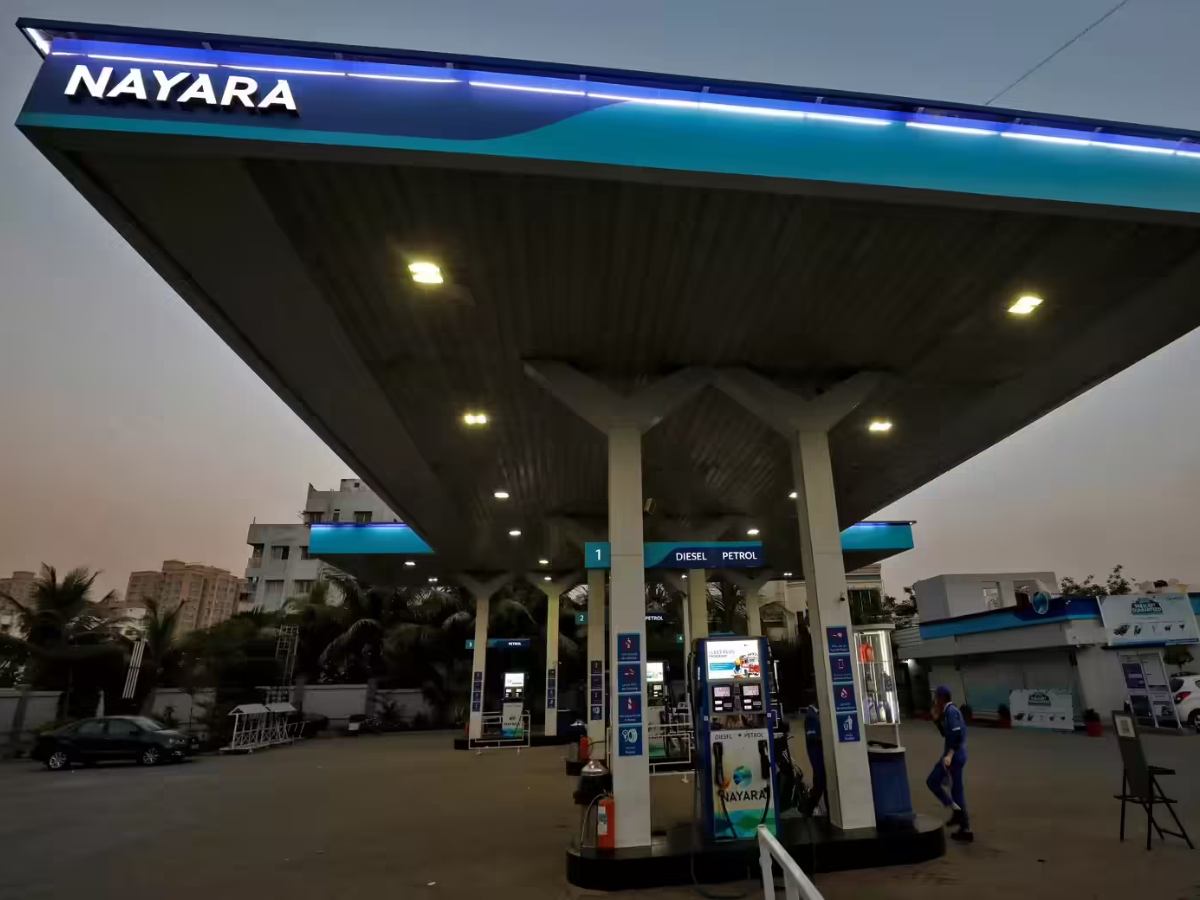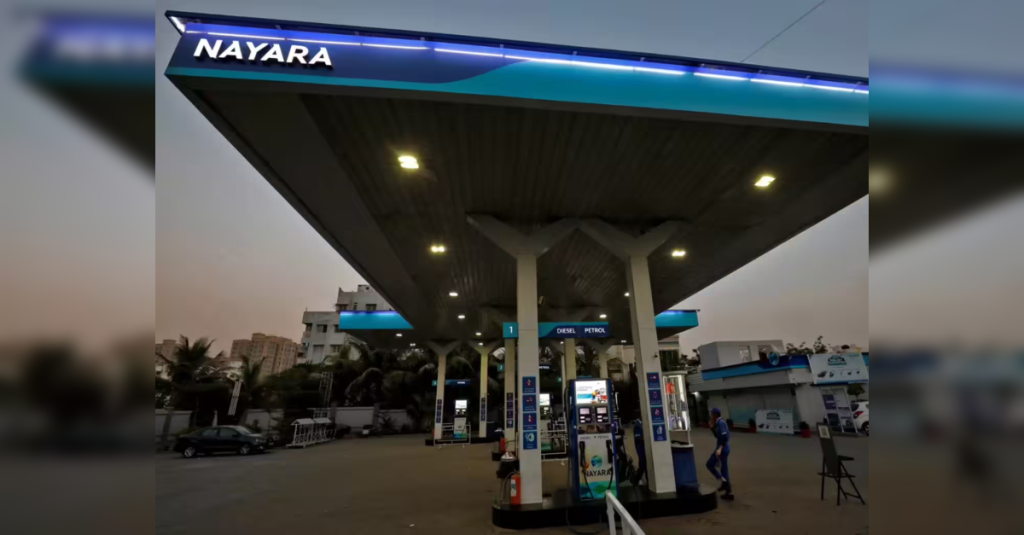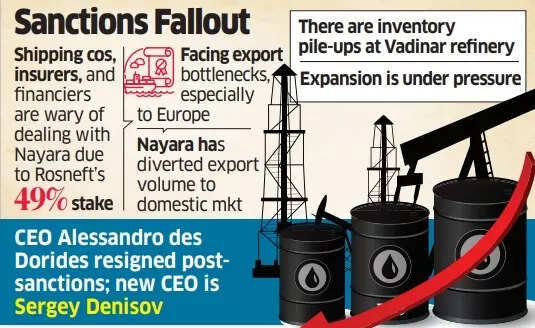
Mumbai: In August 2017, nine months after a consortium led by Russia’s Rosneft bought Essar Oil’s 20-mtpa refinery in Vadinar (Gujarat), it was renamed Nayara Energy. The name derives from the Hindi word ‘Naya’ (new) and ‘Era.’ It was chosen to signify its shareholders’ vision of bringing a new era of development to the asset.
Nayara was born at a time India’s petroleum sector was undergoing reform – the government had deregulated fuel retail prices, giving private fuel retailers such as Nayara an equal footing to expand their outlets.
The reform gave sleepless nights for state-run oil marketing companies, which had hitherto dominated fuel retailing. Now, they feared losing market share to private players Nayara and Reliance Industries.
All was well with Nayara and it was on a growth trajectory until it was hemmed in by both the US and the European Union (EU), as they stepped up efforts to target Russia over its invasion of Ukraine. Its oil and energy revenue was low-hanging fruit.
The company, once seen as a symbol of India-Russia economic cooperation, is now navigating a perfect storm – sanctions, global shipping disruptions, domestic regulatory pressure, a leadership churn and a digital infrastructure scare.
Nayara did not respond to ET’s emailed query as of press time.
Russian Link
For a company that accounts for nearly 8% of India’s refining output and 7% of its retail petrol pump network, these challenges are testing Nayara’s resilience as well as long-term strategy.
Russia’s national energy firm and a consortium of international investors Trafigura and UCP Investment Group had acquired the Essar asset for $12.9 billion. This was Rosneft’s largest foreign investment in India’s refining sector, providing it an entry into one of the fastest-growing world markets.
Nayara Energy owns the second-largest private refinery in India, as well as an oil depot terminal, a port, infrastructure and a chain of more than 6,000 fuel stations.
It is this spate of expansion that is now threatened.
On July 18, the EU unleashed its 18th package of sanctions on Russia, which included restrictions on import of fuels refined from that nation’s crude, slashing the price cap on Russian oil to $47.6 per barrel from $60 and targeting the shadow fleet involved in its transport. The price cap will take effect on September 3. Separately, US President Donald Trump has put 50% tariffs on Indian imports, accusing India of funding Moscow’s war on Ukraine via its oil purchases.
Though Nayara is not directly sanctioned, its significant Russian ownership has triggered cascading effects.
Sanctions Biting
Within a week of the latest EU sanctions, Nayara Energy chief executive Alessandro Des Dorides resigned and was replaced by Sergey Denisov, who had been with the company since 2017.
On July 28, Microsoft restricted Nayara Energy’s access to its own data, proprietary tools and products, despite these being acquired under fully paid-up licences, according to the oil retailer. The US firm later restored services, once Nayara began legal actions against it. But the episode underscored the seriousness of the situation.
“Nayara’s troubles have just begun. It is not only barred from exporting refined products to Europe, but fearing penalties, shipping companies are pulling back from transporting its products. Insurers and trade finance providers are wary,” said a trader familiar with the matter, on condition of anonymity. “This is restricting the company’s ability to move product to its export markets—Europe, Southeast Asia and parts of Africa.”
As per a Care Ratings note in July, exports constituted 25-30% of Nayara’s total revenue, while the balance was domestic sales in India. Nayara has negligible direct exports to the EU, while its majority exports are via traders who, in turn, sell to multiple markets. That hasn’t stopped Nayara from seeking alternative arrangements for payments as EU’s sanctions threaten to bite. It is reportedly seeking a local bank to finance and wire payments for crude oil imports and to help it receive payments for refined fuel product exports.
Potential Sale
Burdened by the heft of sanctions, Rosneft has not been able to repatriate earnings from Nayara Energy in recent years. The lack of repatriation of earnings from the company is believed to be one of the key reasons it has been mulling selling the Indian unit, said people with knowledge of the matter.
But the latest bunch of sanctions has impeded this too. Talks have been held with Indian conglomerates, with the company being valued at more than $20 billion.
Separately, UCP Investment Group, one of the largest financial investment groups in Russia, is also looking to sell its stake in Nayara Energy for over $5 billion. This, after Swiss-headquartered commodity trader Trafigura sold its 24.5% stake to Hara Capital Sarl, a wholly owned subsidiary of Italian energy investment firm Mareterra Group Holding, in January 2023. Industry players, however, said that due to the sanctions, Nayara’s valuation could come down, making it an attractive asset for international buyers.
New Strategies
Global roadblocks have forced Nayara Energy to look inwards. Last week, it reached out to state-run refiners, offering them its export volumes of petrol and diesel to prevent a build-up of unsold inventory.
While the pivot to domestic markets offers near-term relief, it also squeezes margins. Export markets, especially Europe, historically offered better realisations. Domestic competition, more so from state-owned oil marketing companies, limits pricing power and flexibility.
Ironically, all of this comes at a time when Nayara Energy was planning massive growth investments. It had announced plans to invest over ₹70,000 crore in the long term across petrochemicals, ethanol plants and marketing infrastructure expansion, among other projects. It had invested over ₹14,000 crore since August 2017 in various projects in India, including upgrading existing refining facilities, a new petrochemical plant and other infrastructure projects.
But thanks to the sanctions, the company now risks losing technical support from European technology licensors, which is crucial to its refinery operations. The key question is whether Nayara can continue to push forward on diversification while its core refining-export engine sputters under the weight of western pressure.



